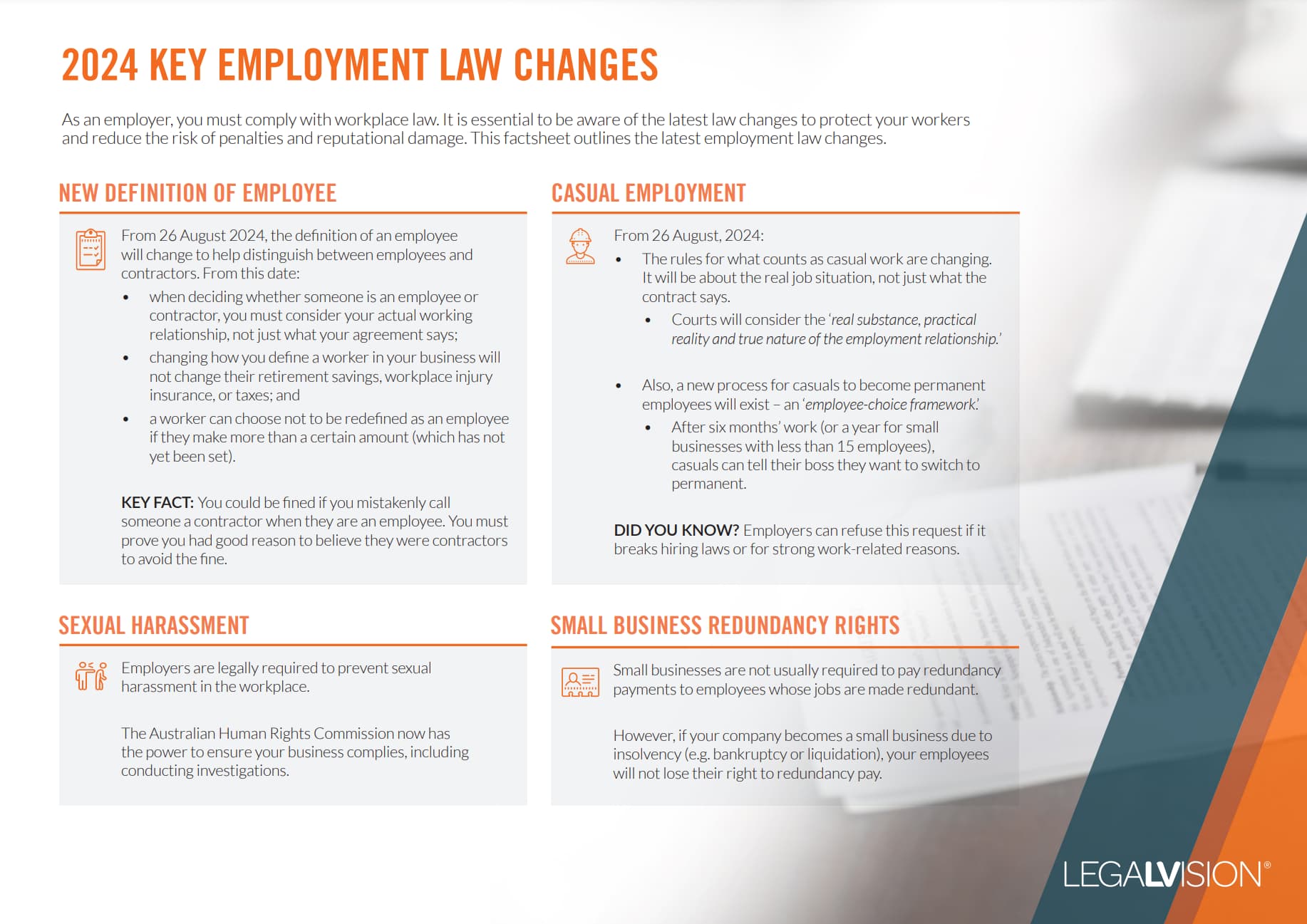Managing casual employees in a fashion and beauty business in Australia involves understanding their rights and obligations. With a firm grasp of your employment law obligations, your business can avoid being sued. There are various legal duties that you owe to casuals and must fulfil. Most of these are found in the Fair Work Act 2009, applying across all states and territories. This article will explain how you can legally manage casual employees at your fashion and beauty business.
Who Classifies as a Casual?
A person is considered a casual employee if they accept a job offer without a firm commitment to ongoing work with an agreed pattern. Some characteristics of casual employees are that they typically:
- have flexible rosters that change weekly;
- can accept or reject shifts;
- do not have access to permanent entitlements such as paid leave; and
- are paid casual loading on top of their wage.
Differences Between Casual and Permanent Employment
The critical difference between casuals and other kinds of employees is that they do not have an advance commitment to ongoing employment. Unlike full-time or part-time employees, casuals do not work regular hours each week.
However, more than regular work patterns are needed to make an employee permanent. Full-time and part-time employees have several entitlements, including:
- paid leave, such as annual and personal leave;
- sick leave; and
- notice periods.

As an employer, it is essential to understand what employment laws have changed and their implications for your business — particularly the changes to the Fair Work Act 2009 through the new Closing the Loopholes legislation.
What Entitlements Do I Owe Casuals?
When it comes to paying casual workers in the fashion and beauty industry, you may:
- pay them the minimum rate suitable to their circumstances under a modern award;
- could negotiate an enterprise agreement with all your casual employees and register this with the Fair Work Commission; or
- agree to an individual flexibility agreement with an individual worker to modify the effect of specific clauses in an award or the enterprise agreement, as long as this does not disadvantage them compared to the prior agreement.
At a minimum, you must pay your casuals the rate specified in the modern award that they are covered by. An award establishes rules for:
- maximum work hours;
- leave entitlements;
- public holidays;
- bonus payments;
- allowances; and
- flexible working arrangements.
There are over 100 awards, so you must select the right one for your organisation’s circumstances. Some awards covering the fashion and beauty industry are the:
- Textile, Clothing, Footwear and Associated Industries Award, which covers workers such as designers, store workers, textile and sewing mechanics;
- Hair and Beauty Industry Award, which covers workers such as hairdressers, barbers, beauticians and nail technicians; and
- Mannequins and Models Award, which covers workers such as models for trade shows and parades.
Casual Conversion
Under the National Employment Standards, casual employees can become permanent after 12 months of regular and systematic employment. You should review your casual workforce to determine which employees are eligible for casual conversion and then update contracts to comply with their new employee status.
Work Health and Safety
The courts have consistently decided that employers have a duty of care to take reasonable precautions to avoid exposing employees to unreasonable risks of injury. Fortunately, most states and territories have enacted comprehensive laws that set your work health and safety responsibilities.
The steps to ensure work health and safety vary based on the circumstances. It is crucial to consider the likelihood of any hazard in your workplace and the degree of harm, including psychological harm, that might result from them. A high magnitude of harm typically calls for a more robust and protective response.
Injuries sometimes arise from handling heavy objects or moving furniture. To provide a workplace free of health and safety incidents, you should:
- implement adequate training and hire qualified staff;
- conduct a regular safety audit and promptly rectify identified risks;
- consult regularly with staff to help mitigate against threats; and
- check that your complaints procedure is adequate to detect problems.
In some states, a company director may be personally liable for breaches of health and safety duties. You can protect yourself by showing that you have acted honestly and fulfilled your duty of care by implementing preventative measures.
Workplace Discrimination
All aspects of the recruitment, onboarding, discipline, promotion and termination process must be free from discrimination. Discrimination based on protected attributes such as race, age, or sexuality is generally not allowed. For example, you cannot take ‘adverse action’ based on age unless age is a necessary job requirement.
One way to prevent discrimination is to establish processes and criteria for hiring, evaluating, and making career decisions. This ensures that decisions are based on merit rather than personal biases. Education programs help staff understand the importance of merit-based choices and the negative impacts of discrimination.
Continue reading this article below the formKey Takeaways
Acting in good faith and for a proper purpose when interacting with casual staff is advisable. You should consider the best practice guidelines for recruitment, pay rates, work health and safety and equal opportunity to ensure that your fashion or beauty business runs smoothly and avoids legal hassles. Developing internal policies in advance will ensure that risk management strategies are in place.
If you have any questions regarding your employee obligations, our experienced employment lawyers can assist as part of our LegalVision membership. For a low monthly fee, you will have unlimited access to lawyers to answer your questions and draft and review your documents. Call us today on 1300 544 755 or visit our membership page.
We appreciate your feedback – your submission has been successfully received.










